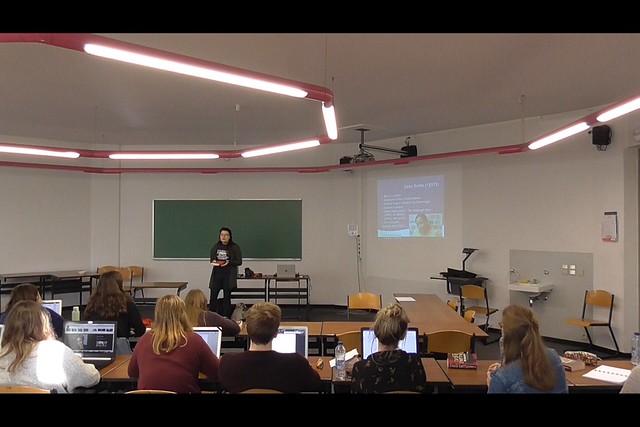As the students file in for their first seminar of the semester, I cannot help but notice how homogenous they appear. They quietly take their seats and proceed to converse with their friends in hushed whispers. Among these mostly white students, I hear mostly Flemish. This is understandable since, as soon as I begin the seminar, we will all be committed to the English language for the next two hours. With a few minutes to spare, I quickly look through my presentation on Zadie Smith’s novel, On Beauty, a powerful depiction of race, gender, and affirmative action. When the clock reads 9:00am, just before I begin my lecture, I catch a glimpse of myself reflected in the computer screen and I am reminded that I look just like my students.
As a Fulbright English Teaching Assistant (ETA) placed at the University of Antwerp, one of my tasks is to be a representative of American culture. To fulfill this task, for instance, I conducted a seminar on the 2018 U.S. Midterm Elections this past fall, on that very Tuesday, November 6. I answered questions like: “What is the difference between federal and state laws?” and, “Why doesn’t America have mandatory voting like Belgium?” These topics can be complex in their own way, but they never intimidated me because they allowed an objective distance. I could reply clinically with definitions and historical facts.
A much greater challenge came when I was given the responsibility of discussing American literature depicting the socio-cultural intricacies of diversity in America.
Antwerp is the second largest city in Belgium, with over half a million inhabitants. The entire province of Antwerp is home to almost two million people, making it the most densely populated province in the country. As a metropolitan area, the city of Antwerp has been described as one of the most diverse European cities. Antwerp is home to large populations immigrating from countries like Morocco and Turkey, and the immigration is not predicted to decrease in the near future. One of the largest communities of orthodox Jews in the world outside Israel can also be found in Antwerp. However, my experience in university classrooms has not always seemed to reflect this diversity, a situation in which American universities have experienced as well.
While the reasons for low numbers in minority representation in Belgian universities do not parallel in every way those in the United States, I still felt that I had a daunting task ahead of me. At one point, I came to the realization that my position as a Fulbright grantee was to somewhat represent all voices in the U.S., including minority populations of which I am not a part. In addition to Smith’s novel, the students were reading Colson Whitehead’s The Underground Railroad, Jacqueline Woodson’s Brown Girl Dreaming, and Kazuo Ishiguro’s Never Let Me Go; each novel listed illustrates, in some way, themes of being a minority whose voice is either hushed or completely muted. I had no intention of shying away from such a crucial discussion, but I found myself worrying that I would not do the topic of American diversity justice since, “Privilege is invisible to those who have it,” a phrase coined by American sociologist Michael Kimmel. How could I adequately present the voices of those whose lives I can never fully understand due to the certain privileges in my life?
From March 16 to 20, 2019, I attended the 65th annual Berlin Seminar with 550 Fulbright grantees, alumni and guests. In addition to the inspiring panel presentations and development workshops, one of the major themes of the Berlin Seminar was diversity. On this subject, Stephen Frost (Founder & CEO, Frost Included; former Head of Diversity & Inclusion, London Olympics and Paralympics; Alumnus, Fulbright United Kingdom) led the Keynote & Plenary Discussion titled “Diversity is a Reality. Inclusion is a Choice.” Frost and his associate, Raafi Alidina, discussed the importance of transforming individual experiences into institutional change with diversity and inclusion. To a packed audience of attentive, determined Fulbrighters, they asserted that diversity is a combination of DNA, social context, and life experience. I have always viewed myself as homogenous and lacking in diversity. However, by considering such aspects as life experience and social context, I am realizing that I have more to offer my students than I thought. If one takes the right steps, then their diversity is ever-growing.
When discussing themes in the novels of Whitehead and Smith, I quickly learned that personal experiences from my own life or those close to me have been the most enriching in the classroom. While such discussions about racial equality or gender norms are never simple, this Fulbright grant has given me the opportunity to share my relationship to these socio-cultural topics. And, by giving my perspective voluntarily to an audience whose majority has never stepped foot in the U.S., I am following Frost and Alidina’s example, by demonstrating that inclusion is a choice. The Fulbright Program itself proves this every day as scholars and ETAs participate in daily cultural exchanges.
While this experience as a Fulbright ETA in Belgium has taught me so many invaluable lessons, I will never forget that this opportunity has allowed me to admit my limitations but not let it stop me from using my voice to remind others that there exist other voices, less often heard from but no less valuable.
Leandra Griffith is a 2018-2019 Fulbright English Teaching Assistant to Belgium. After graduating with a bachelor’s degree in Creative Writing and Communication from the State University of New York at Geneseo, NY (SUNY Geneseo), Leandra served as a City Year Americorps member in San Jose, CA.
Articles are written by Fulbright grantees and do not reflect the opinions of the Fulbright Commission, the grantees’ host institutions, or the U.S. Department of State.
